Fleurs du Mal Magazine


Or see the index
Er bestaat slechts één roman, en daar zijn wij tegelijkertijd zowel de verteller als het onderwerp van: de Geschiedenis.
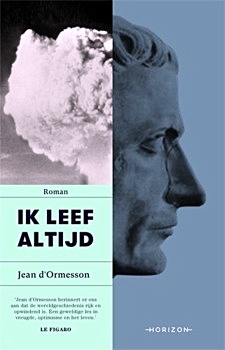 Al de rest is een schaamteloze kopie. Deze wereldroman vertelt de Geschiedenis eeuw na eeuw en laat ons de avonturen en ontdekkingen van de mensheid herbeleven.
Al de rest is een schaamteloze kopie. Deze wereldroman vertelt de Geschiedenis eeuw na eeuw en laat ons de avonturen en ontdekkingen van de mensheid herbeleven.
De Geschiedenis is zowel oermens, Romein als Napoleons minnares; ze begroet de boekdrukkunst, de Nieuwe Wereld en de moderne wetenschappen en voelt zich thuis in Jeruzalem, Byzantium, Venetië en New York.
Ik leef altijd is een meesterwerk vol ironie en blijmoedigheid, en een intellectuele autobiografie van de auteur.
Jean d’Ormesson (1925 – 2017) was een groot Frans schrijver, filosoof, journalist en lid van de Académie Française. Hij schreef meer dan 40 boeken, fictie en essays. Drie dagen voor zijn overlijden finaliseerde hij zijn laatste boek, Ik leef altijd. Bij publicatie werd het meteen nummer 1 in Frankrijk.
Jean D’Ormesson:
Ik leef altijd
Auteur: Jean D’Ormesson
Vertaling: Johan op de Beeck
Taal: Nederlands
Paperback
Verschijningsdatum
6 september 2018
1e druk
Afmetingen 21 x 13,6 x 2,8 cm
288 pagina’s
ISBN: 9789492626875
Uitg. Horizon
€ 21.99
# new books
fleursdumal.nl magazine
More in: - Book News, - Bookstores, Archive O-P, Art & Literature News
Pablo Picasso and Gertrude Stein. Few can be said to have had as broad an impact on European art in the twentieth century as these two cultural giants.
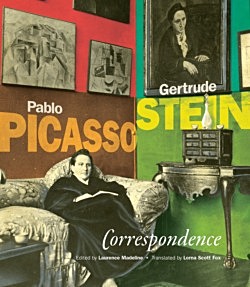 Pablo Picasso, a pioneering visual artist, created a prolific and widely influential body of work.
Pablo Picasso, a pioneering visual artist, created a prolific and widely influential body of work.
Gertrude Stein, an intellectual tastemaker, hosted the leading salon for artists and writers between the wars in her Paris apartment, welcoming Henri Matisse, Ernest Hemingway, and Ezra Pound to weekly events at her home to discuss art and literature.
It comes as no surprise, then, that Picasso and Stein were fast friends and frequent confidantes. Through Picasso and Stein’s casual notes and reflective letters, this volume of correspondence between the two captures Paris both in the golden age of the early twentieth century and in one of its darkest hours, the Nazi occupation through mentions of dinner parties, lovers, work, and the crises of the two world wars. Illustrated with photographs and postcards, as well as drawings and paintings by Picasso, this collection captures an exhilarating period in European culture through the minds of two artistic greats.
Correspondence
Pablo Picasso and Gertrude Stein
Paper $27.50
ISBN: 9780857425850
Published September 2018
Cloth $29.95
ISBN: 9781905422913
Published November 2008
Distributed for Seagull Books
Edited by Laurence Madeline.
Translated by Lorna Scott Fox.
390 pages
Biography and Letters
Illustrations
new books
Pablo Picasso and Gertrude Stein
fleursdumal.nl magazine
More in: - Book News, - Bookstores, Archive O-P, Archive S-T, Art & Literature News, Gertrude Stein, Pablo Picasso, Stein, Gertrude
Thriller with film rights sold to the creators of The Girl On the Train.
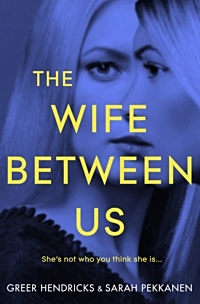 This one will keep you guessing.’ – Anita Shreve, author of The Stars are Fire When you read this book, you will make many assumptions. It’s about a jealous wife, obsessed with her replacement. It’s about a younger woman set to marry the man she loves.
This one will keep you guessing.’ – Anita Shreve, author of The Stars are Fire When you read this book, you will make many assumptions. It’s about a jealous wife, obsessed with her replacement. It’s about a younger woman set to marry the man she loves.
The first wife seems like a disaster; her replacement is the perfect woman. You will assume you know the motives, the history, the anatomy of the relationships. You will be wrong. The Wife Between Us is the first collaboration between Greer Hendricks and Sarah Pekkanen.
Greer Hendricks spent over two decades as an editor. Prior to her tenure in book publishing, she worked at Allure Magazine and earned her Masters in Journalism from Columbia University. Her writing has been published in the New York Times and Publishers Weekly. Greer lives in Manhattan with her husband, two children, and very needy dog, Rocky. The Wife Between Us is her first novel.
Sarah Pekkanen is the internationally and USA Today bestselling author of several novels including Skipping a Beat. A former investigative journalist and feature writer, her work has been published in The Washington Post, USA Today, and many others. She is the mother of three sons and lives just outside Washington, D.C.
Greer Hendricks & Sarah Pekkanen
The Wife Between Us
Trade Paperback
Publ Date: July 26, 2018
Category: Fiction / Thriller
Publisher: Pan Books / Macmillan
Pages: 352
Language: English
ISBN-10: 1509842837
ISBN-13: 978-1509842834
new books
fleursdumal.nl magazine
More in: - Book News, - Bookstores, Archive G-H, Archive O-P, Art & Literature News, Thrillers
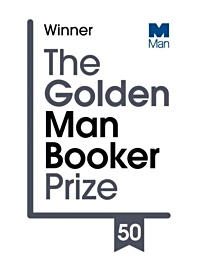 The English Patient by Michael Ondaatje (Bloomsbury) has been crowned the best work of fiction from the last five decades of the Man Booker Prize. The Golden Man Booker winner was revealed at the Man Booker 50 Festival in Royal Festival Hall at Southbank Centre.
The English Patient by Michael Ondaatje (Bloomsbury) has been crowned the best work of fiction from the last five decades of the Man Booker Prize. The Golden Man Booker winner was revealed at the Man Booker 50 Festival in Royal Festival Hall at Southbank Centre.
The winner of this special one-off award for the Man Booker Prize’s 50th anniversary celebrations was chosen by the public.
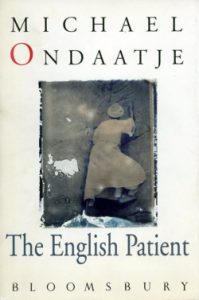 The Golden Man Booker Prize, a special one-off award to celebrate the 50th anniversary in 2018, crowns the best work of fiction from the last five decades of the prize, as chosen by five judges and then voted for by the public.
The Golden Man Booker Prize, a special one-off award to celebrate the 50th anniversary in 2018, crowns the best work of fiction from the last five decades of the prize, as chosen by five judges and then voted for by the public.
The English Patient by Michael Ondaatje is set in 1945.
The English Patient explores the lives of four very disparate war torn people, a young woman and three men, who take refuge in a damaged villa north of Florence as the war retreats around them.
In an upstairs room lies the badly burned English patient, alive but unable to move. His extraordinary adventures and turbulent love affair in the North African desert before the war provide the focus around which the vivid tales of his companions revolve.
His very presence will forever change the destiny of those around him.
The Golden Man Booker Prize 2018
fleursdumal.nl magazine
More in: - Book Lovers, - Book News, Archive O-P, Art & Literature News, Awards & Prizes
Tatiana du Plessix, the wife of a French diplomat, was a beautiful, sophisticated “white Russian” who had been the muse of the famous Russian poet Vladimir Mayakovsky.
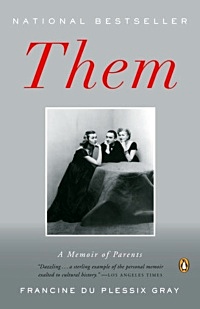 Alexander Liberman, the ambitious son of a prominent Russian Jew, was a gifted magazine editor and aspiring artist. As part of the progressive artistic Russian émigré community living in Paris in the 1930s, the two were destined to meet. They began a passionate affair, and the year after Paris was occupied in World War II they fled to New York with Tatiana’s young daughter, Francine.
Alexander Liberman, the ambitious son of a prominent Russian Jew, was a gifted magazine editor and aspiring artist. As part of the progressive artistic Russian émigré community living in Paris in the 1930s, the two were destined to meet. They began a passionate affair, and the year after Paris was occupied in World War II they fled to New York with Tatiana’s young daughter, Francine.
There they determinedly rose to the top of high society, holding court to a Who’s Who list of the midcentury’s intellectuals and entertainers. Flamboyant and outrageous, bold and brilliant, they were irresistible to friends like Marlene Dietrich, Salvador Dalí, and the publishing tycoon Condé Nast. But to those who knew them well they were also highly neurotic, narcissistic, and glacially self-promoting, prone to cut out of their lives, with surgical precision, close friends who were no longer of use to them.
Tatiana became an icon of New York fashion, and the hats she designed for Saks Fifth Avenue were de rigueur for stylish women everywhere. Alexander Liberman, who devotedly raised Francine as his own child from the time she was nine, eventually came to preside over the entire Condé Nast empire. The glamorous life they shared was both creative and destructive and was marked by an exceptional bond forged out of their highly charged love and raging self-centeredness. Their obsessive adulation of success and elegance was elevated to a kind of worship, and the high drama that characterized their lives followed them to their deaths. Tatiana, increasingly consumed with nostalgia for a long-lost Russia, spent her last years addicted to painkillers. Shortly after her death, Alexander, then age eighty, shocked all who knew him by marrying her nurse.
Them: A Portrait of Parents is a beautifully written homage to the extraordinary lives of two fascinating, irrepressible people who were larger than life emblems of a bygone age. Written with honesty and grace by the person who knew them best, this generational saga is a survivor’s story. Tatiana and Alexander survived the Russian Revolution, the fall of France, and New York’s factory of fame. Their daughter, Francine, survived them.
Francine du Plessix Gray is a regular contributor to The New Yorker and the author of numerous essays and books, including Simone Weil, At Home with the Marquis de Sade: A Life, Rage and Fire, Lovers and Tyrants, and Soviet Women. She lives with her husband, the painter Cleve Gray.
Francine Du Plessix Gray
Them
A Memoir of Parents
Paperback
$18.00
Penguin Books
2006
544 Pages
ISBN 9780143037194
books
fleursdumal.nl magazine
More in: - Book News, - Book Stories, Archive O-P, Majakovsky, Vladimir
Jérôme Peignot, romancier, essayiste, est aussi l’auteur d’une œuvre poétique consacrée à interroger l’écriture dans sa matérialité, proposant de celle-ci une lecture typographique ludique.
 Dans ce recueil imaginatif et facétieux de typoèmes, chiffres, lettres, palindromes, anagrammes, esperluettes, virgules… sont autant d’images alphabétiques nouvelles pour “retrouver l’étymologie graphique des êtres et des choses”.
Dans ce recueil imaginatif et facétieux de typoèmes, chiffres, lettres, palindromes, anagrammes, esperluettes, virgules… sont autant d’images alphabétiques nouvelles pour “retrouver l’étymologie graphique des êtres et des choses”.
Une poésie visuelle concrète qui révèle ainsi, par l’invention, l’humour et l’impromptu, “les mécanismes graphiques jusque dans leurs intimes arcanes, et partant, témoigne qu’ils ne sont pas lettres mortes”.
Jérôme Peignot, poète et écrivain, a publié une trentaine d’ouvrages, régulièrement réédités, dont Typoésie (Éditions de l’imprimerie nationale, 1993 réée. 2005), Typoèmes (Seuil, 2003) et Les Jeux de l’amour et du langage (10/1, 1974 rééd. 2009). Ces dernières années, il creuse le sillon de la poésie et publie des sonnets dans la revue Conférence ou en recueils (Éditions des cendres, Éditions de l’amandier).
Jérôme Peignot
Typoèmes
Poésie visuelle
Hors collection
Actes Sud
Poésie
Novembre, 2017
11,5 x 17,0
156 pages
ISBN 978-2-330-08731-9
prix indicatif: 16,80€
new books
fleursdumal.nl magazine
More in: #Archive Concrete & Visual Poetry, *Concrete + Visual Poetry P-T, - Book News, Archive O-P, Archive O-P, Art & Literature News
The story of how literature shaped world history, in sixteen acts—from Alexander the Great and the Iliad to Don Quixote and Harry Potter
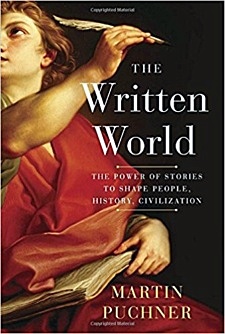 In this groundbreaking book, Martin Puchner leads us on a remarkable journey through time and around the globe to reveal the powerful role stories and literature have played in creating the world we have today.
In this groundbreaking book, Martin Puchner leads us on a remarkable journey through time and around the globe to reveal the powerful role stories and literature have played in creating the world we have today.
Puchner introduces us to numerous visionaries as he explores sixteen foundational texts selected from more than four thousand years of world literature and reveals how writing has inspired the rise and fall of empires and nations, the spark of philosophical and political ideas, and the birth of religious beliefs. Indeed, literature has touched the lives of generations and changed the course of history.
At the heart of this book are works, some long-lost and rediscovered, that have shaped civilization: the first written masterpiece, the Epic of Gilgamesh; Ezra’s Hebrew Bible, created as scripture; the teachings of Buddha, Confucius, Socrates, and Jesus; and the first great novel in world literature, The Tale of Genji, written by a Japanese woman known as Murasaki. Visiting Baghdad, Puchner tells of Scheherazade and the stories of One Thousand and One Nights, and in the Americas we watch the astonishing survival of the Maya epic Popol Vuh. Cervantes, who invented the modern novel, battles pirates both real (when he is taken prisoner) and literary (when a fake sequel to Don Quixote is published).
We learn of Benjamin Franklin’s pioneering work as a media entrepreneur, watch Goethe discover world literature in Sicily, and follow the rise in influence of The Communist Manifesto. We visit Troy, Pergamum, and China, and we speak with Nobel laureates Derek Walcott in the Caribbean and Orhan Pamuk in Istanbul, as well as the wordsmiths of the oral epic Sunjata in West Africa.
Throughout The Written World, Puchner’s delightful narrative also chronicles the inventions—writing technologies, the printing press, the book itself—that have shaped religion, politics, commerce, people, and history. In a book that Elaine Scarry has praised as “unique and spellbinding,” Puchner shows how literature turned our planet into a written world.
Title: The Written World
Subtitle: The Power of Stories to Shape People, History, Civilization
Author: Martin Puchner
Publisher: Random House
Format Hardcover, $32.00
ISBN-10 0812998936
ISBN-13 9780812998931
Publication Date: 24 October 2017
Nb of pages 448 p.
new books
fleursdumal.nl magazine
More in: - Book Lovers, - Book News, - Book Stories, Archive O-P, Art & Literature News, Libraries in Literature, PRESS & PUBLISHING, The Art of Reading
A new collection of thirteen mesmerizing stories by American master Joyce Carol Oates, including the 2017 Pushcart Prize–winning “Undocumented Alien”
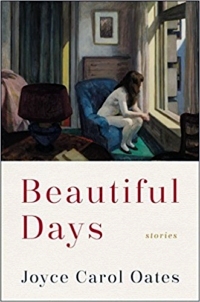 The diverse stories of Beautiful Days, Joyce Carol Oates explore the most secret, intimate, and unacknowledged interior lives of characters not unlike ourselves, who assert their independence in acts of bold and often irrevocable defiance.
The diverse stories of Beautiful Days, Joyce Carol Oates explore the most secret, intimate, and unacknowledged interior lives of characters not unlike ourselves, who assert their independence in acts of bold and often irrevocable defiance.
“Fleuve Bleu” exemplifies the rich sensuousness of Oates’s prose as lovers married to other persons vow to establish, in their intimacy, a ruthlessly honest, truth-telling authenticity missing elsewhere in their complicated lives, with unexpected results.
In “Big Burnt,” set on lushly rendered Lake George, in the Adirondacks, a cunningly manipulative university professor exploits a too-trusting woman in a way she could never have anticipated. “The Nice Girl” depicts a young woman who has been, through her life, infuriatingly “nice,” until she is forced to come to terms with the raw desperation of her deepest self. In a more experimental but no less intimate mode, “Les beaux jours” examines the ambiguities of an intensely erotic, exploitative relationship between a “master” artist and his adoring young female model. And the tragic “Undocumented Alien” depicts a young African student enrolled in an American university who is suddenly stripped of his student visa and forced to undergo a terrifying test of courage.
In these stories, as elsewhere in her fiction, Joyce Carol Oates exhibits her fascination with the social, psychological, and moral boundaries that govern our behavior—until the hour when they do not.
Title: Beautiful Days
Subtitle: Stories
Author: Joyce Carol Oates
Publisher: Ecco
Title First Published: 06 February 2018
Format: Hardcover
ISBN-10 0062795783
ISBN-13 9780062795786
Main content page count: 352
$26.99
new fiction
fleursdumal.nl magazine
More in: #Short Stories Archive, - Book Lovers, - Book Stories, Archive O-P, Art & Literature News
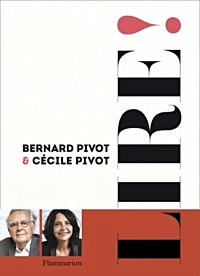 Bernard Pivot, lecteur professionnel (“Apostrophes”, Lire, JDD) et sa fille Cécile, ardente lectrice amateur, confrontent leurs raisons, plaisirs et manières de lire, leur usage des livres, dans des textes très personnels, joliment illustrés, où le public des librairies et des bibliothèques retrouvera ses émotions, et celui qui n’ose pas en pousser les portes découvrira stimulations et conseils.
Bernard Pivot, lecteur professionnel (“Apostrophes”, Lire, JDD) et sa fille Cécile, ardente lectrice amateur, confrontent leurs raisons, plaisirs et manières de lire, leur usage des livres, dans des textes très personnels, joliment illustrés, où le public des librairies et des bibliothèques retrouvera ses émotions, et celui qui n’ose pas en pousser les portes découvrira stimulations et conseils.
Un tonique et savoureux éloge des écrivains, des livres et de la lecture.
Bernard Pivot, Cécile Pivot
Lire !
Paru le 14/03/2018
Genre : Essais littéraires
192 pages
174 x 239 mm Couleur
Broché
EAN: 9782081416307
ISBN : 9782081416307
€25,00
Ed. Flammarion
new books on reading
fleursdumal.nl magazine
More in: - Book Stories, Archive O-P, Art & Literature News, Libraries in Literature, The Art of Reading
In Mondriaan en Steiner – wegen naar Nieuwe Beelding – wordt het werk van Piet Mondriaan bekeken vanuit het gedachtegoed van Rudolf Steiner.
 Deze esoterische bron is tot op heden vrijwel veronachtzaamd in kunsthistorische publicaties over Mondriaan. Voor deze publicatie is gebruik gemaakt van Mondriaans bundel transcripties van de voordrachten die Steiner in 1908 in Nederland hield en deel uitmaakte van de nalatenschap van Mondriaan. Van belang is dat Mondriaan Steiners voordrachten niet alleen koesterde maar ook van potloodmarkeringen voorzag.
Deze esoterische bron is tot op heden vrijwel veronachtzaamd in kunsthistorische publicaties over Mondriaan. Voor deze publicatie is gebruik gemaakt van Mondriaans bundel transcripties van de voordrachten die Steiner in 1908 in Nederland hield en deel uitmaakte van de nalatenschap van Mondriaan. Van belang is dat Mondriaan Steiners voordrachten niet alleen koesterde maar ook van potloodmarkeringen voorzag.
In het onderzoek zijn deze voordrachten verbonden aan Mondriaans creatieve zoektocht naar abstractie. Dit levert verrassend nieuwe inzichten op. Gaandeweg wordt zichtbaar gemaakt hoe hij aan dat universele proces individueel uitdrukking gaf.
Titel: Mondriaan en Steiner
Author: Jacqueline van Paaschen
Year: 2017
Language: nederlands
Size: 20 x 27 cm
Pages: 192
Edition: Hardcover
ISBN10 9491525646
ISBN13 9789491525643
Illustrations
Publ.: Komma, Uitgeverij
€ 34,00
new books
fleursdumal.nl magazine
More in: - Book News, Archive O-P, Art & Literature News, De Stijl, FDM Art Gallery, MONTAIGNE, Piet Mondriaan, Piet Mondriaan
The poetry of Edgar Allan Poe has had a rough ride in America, as Emerson’s sneering quip about “The Jingle Man” testifies.
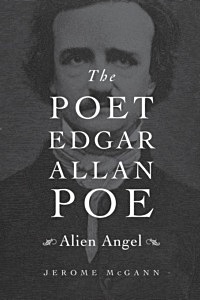 That these poems have never lacked a popular audience has been a persistent annoyance in academic and literary circles; that they attracted the admiration of innovative poetic masters in Europe and especially France—notably Baudelaire, Mallarmé, and Valéry—has been further cause for embarrassment. Jerome McGann offers a bold reassessment of Poe’s achievement, arguing that he belongs with Whitman and Dickinson as a foundational American poet and cultural presence.
That these poems have never lacked a popular audience has been a persistent annoyance in academic and literary circles; that they attracted the admiration of innovative poetic masters in Europe and especially France—notably Baudelaire, Mallarmé, and Valéry—has been further cause for embarrassment. Jerome McGann offers a bold reassessment of Poe’s achievement, arguing that he belongs with Whitman and Dickinson as a foundational American poet and cultural presence.
Not all American commentators have agreed with Emerson’s dim view of Poe’s verse. For McGann, a notable exception is William Carlos Williams, who said that the American poetic imagination made its first appearance in Poe’s work. The Poet Edgar Allan Poe explains what Williams and European admirers saw in Poe, how they understood his poetics, and why his poetry had such a decisive influence on Modern and Post-Modern art and writing. McGann contends that Poe was the first poet to demonstrate how the creative imagination could escape its inheritance of Romantic attitudes and conventions, and why an escape was desirable. The ethical and political significance of Poe’s work follows from what the poet takes as his great subject: the reader.
The Poet Edgar Allan Poe takes its own readers on a spirited tour through a wide range of Poe’s verse as well as the critical and theoretical writings in which he laid out his arresting ideas about poetry and poetics.
Jerome McGann is University Professor and John Stewart Bryan Professor of English at the University of Virginia.
“McGann succeeds in forcing us to rethink Poe’s poetry… Poe’s sound experiments, especially his strange variations on meter, deserve, as McGann shows by citing numerous rhythmic anomalies, to be taken seriously… In an age of predominantly, and purposely, flat and prosaic ‘free verse,’ mnemonic patterning is perhaps re-emerging as the emblem of poetic power. In this sense, Poe is once again Our Contemporary… In making the case for the close link between the poetry and the aesthetic theory, [McGann] succeeds admirably: Poe’s reputation as poete maudit belies the fact that here was a poet who knew exactly what he was doing.” — Marjorie Perloff, The Times Literary Supplement
Jerome McGann
The Poet Edgar Allan Poe
Alien Angel
256 pages
2014
Hardcover
Harvard University Press
€23.00
ISBN 9780674416666
literary criticism books
fleursdumal.nl magazine
More in: - Book Stories, Archive O-P, Archive O-P, Art & Literature News, Edgar Allan Poe, Poe, Edgar Allan, Poe, Edgar Allan, Tales of Mystery & Imagination
From the Nobel Prize-winning author of My Name Is Red and Snow, a large-format, deluxe, collectible edition of his beloved memoir about life in Istanbul, with more than 200 added illustrations and a new introduction.
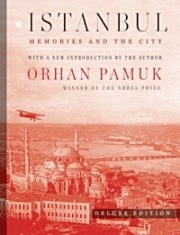 Orhan Pamuk was born in Istanbul and still lives in the family apartment building where his mother first held him in her arms. His portrait of his city is thus also a self-portrait, refracted by memory and the melancholy–or hüzün–that all Istanbullus share: the sadness that comes of living amid the ruins of a lost empire. With cinematic fluidity, Pamuk moves from the lives of his glamorous, unhappy parents to the gorgeous, decrepit mansions overlooking the Bosphorus; from the dawning of his self-consciousness to the writers and painters–both Turkish and foreign–who would shape his consciousness of his city. Like Joyce’s Dublin and Borges’ Buenos Aires, Pamuk’s Istanbul is a triumphant encounter of place and sensibility, beautifully written and immensely moving.
Orhan Pamuk was born in Istanbul and still lives in the family apartment building where his mother first held him in her arms. His portrait of his city is thus also a self-portrait, refracted by memory and the melancholy–or hüzün–that all Istanbullus share: the sadness that comes of living amid the ruins of a lost empire. With cinematic fluidity, Pamuk moves from the lives of his glamorous, unhappy parents to the gorgeous, decrepit mansions overlooking the Bosphorus; from the dawning of his self-consciousness to the writers and painters–both Turkish and foreign–who would shape his consciousness of his city. Like Joyce’s Dublin and Borges’ Buenos Aires, Pamuk’s Istanbul is a triumphant encounter of place and sensibility, beautifully written and immensely moving.
Orhan Pamuk won the Nobel Prize for Literature in 2006. His novel My Name Is Red won the 2003 IMPAC Dublin Literary Award. His work has been translated into more than sixty languages. He lives in Istanbul.
Istanbul (Deluxe Edition)
Memories and the City
By Orhan Pamuk
Hardcover
Oct 24, 2017
624 Pages
$45.00
Published by Knopf
7 x 9-1/8
ISBN 9781524732233
fleursdumal.nl magazine
More in: - Book News, - Book Stories, Archive O-P, Art & Literature News, Orhan Pamuk
Thank you for reading Fleurs du Mal - magazine for art & literature